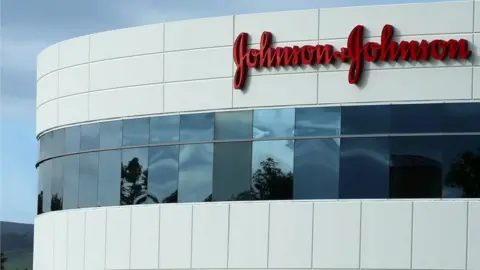Johnson & Johnson faces trial over opioid crisis in Oklahoma
 Reuters
ReutersJohnson & Johnson, one of the world's largest drug manufacturers, has gone on trial in a multi-billion dollar lawsuit by the US state of Oklahoma.
Prosecutors accuse the firm of deceptively marketing painkillers and downplaying addiction risks, fuelling a so-called "opioid epidemic".
Johnson & Johnson denies wrongdoing and says it marketed products responsibly.
It is the first of 2,000 cases brought by state, local and tribal governments against pharmaceutical firms in the US.
On average, 130 Americans die from an opioid overdose every day, according to the Centers for Disease Control and Prevention.
In 2017, of the 70,200 people who died from an overdose, 68% involved a prescription or illegal opioid.
In its court filing, Oklahoma alleged that Johnson & Johnson was the "kingpin" behind "the worst man-made public health crisis in [the] state's history," growing and importing raw materials which other drug-makers used for their own products.
What happened in court?
In opening statements in the city of Norman on Tuesday, the state said that Johnson & Johnson along with Purdue Pharma - which produces the prescription painkiller OxyContin - and Israel-based Teva Pharmaceuticals had pushed doctors to prescribe more opioids in the 1990s by using misleading marketing.
State lawyer Brad Beckworth said Johnson & Johnson did so by marketing opioids as "safe and effective for everyday pain" but downplayed addictive qualities and thus helped to create a drug oversupply.
"If you have an oversupply, people will die," he said.
 Reuters
ReutersMike Hunter, Oklahoma's attorney general, told the court that it was time to hold the companies "responsible for their actions".
"This is the worst man-made public health crisis in our state's history. To put it bluntly, this crisis is devastating Oklahoma," he said.
For Johnson & Johnson, lawyer Larry Ottaway said the company's marketing statements were no different from those made by the US Food and Drug Administration in 2009 which said painkillers, when properly managed, rarely caused addictions.
"We're not mocking anyone, but facts are stubborn things," he said.
 Reuters
ReutersWhat's the background?
The state argues that Johnson & Johnson created a public nuisance which will cost between $12.7bn (£10.02bn) and $17.5bn (£13.8bn) to remedy over the next 20 to 30 years.
But the company argues that the public nuisance law does not apply in this instance.
Johnson & Johnson - probably best known for its baby shampoo and baby powder - produces a fentanyl patch which can be prescribed for severe pain.
 Getty Images
Getty ImagesFentanyl belongs to a class of drugs known as opioid analgesics, which change how the body feels and responds to pain. It is also used as a recreational drug, often mixed with heroin and cocaine.
Because of its high profit margin for traffickers, fentanyl has become a large part of America's opioid crisis.
The latest legal case is the latest in a string against painkiller manufacturers over prescription drugs.
Earlier this month, Teva Pharmaceuticals agreed to an $85m (£67m) settlement with Oklahoma over a similar lawsuit which claimed its opioids had contributed to the deaths of thousands of people.
Purdue Pharma also reached a $270m settlement with Oklahoma in a separate case. The wealthy Sackler family, which owns the firm, has been charged with fraudulently transferring money from the company to protect its funds from litigation.
